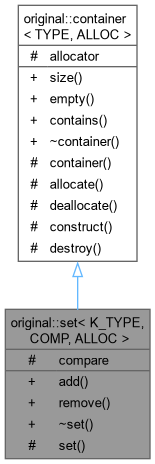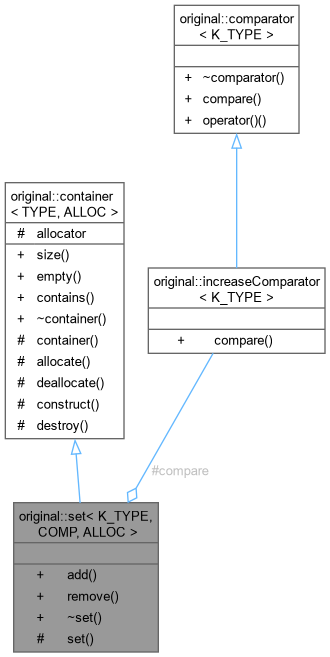original::set< K_TYPE, ALLOC > Class Template Referenceabstract
Abstract base class for unique element containers. More...
#include <set.h>
Inheritance diagram for original::set< K_TYPE, ALLOC >:

Collaboration diagram for original::set< K_TYPE, ALLOC >:

Public Member Functions | |
| virtual bool | add (const K_TYPE &e)=0 |
| Adds a new element to the set. | |
| virtual bool | remove (const K_TYPE &e)=0 |
| Removes an element from the set. | |
| ~set () override | |
| Destructor implementation. | |
 Public Member Functions inherited from original::container< TYPE, ALLOC > Public Member Functions inherited from original::container< TYPE, ALLOC > | |
| virtual u_integer | size () const =0 |
| Gets the number of elements in the container. | |
| bool | empty () const |
| Checks if the container is empty. | |
| virtual bool | contains (const TYPE &e) const =0 |
| Checks if an element is contained in the container. | |
| virtual | ~container ()=default |
| Destructor for the container class. | |
Protected Member Functions | |
| set (ALLOC alloc=ALLOC{}) | |
| Constructor implementation. | |
 Protected Member Functions inherited from original::container< TYPE, ALLOC > Protected Member Functions inherited from original::container< TYPE, ALLOC > | |
| container (ALLOC alloc=ALLOC{}) | |
| Constructs a container with specified allocator. | |
| TYPE * | allocate (u_integer size) |
| Allocates raw memory for elements. | |
| void | deallocate (TYPE *ptr, u_integer size) |
| Deallocates memory previously allocated by allocate() | |
| template<typename O_TYPE , typename... Args> | |
| void | construct (O_TYPE *o_ptr, Args &&... args) |
| Constructs an element in-place. | |
| template<typename O_TYPE > | |
| void | destroy (O_TYPE *o_ptr) |
| Destroys an element. | |
Additional Inherited Members | |
 Protected Attributes inherited from original::container< TYPE, ALLOC > Protected Attributes inherited from original::container< TYPE, ALLOC > | |
| ALLOC | allocator |
| The allocator instance used for memory management. | |
Detailed Description
template<typename K_TYPE, typename ALLOC = allocator<K_TYPE>>
class original::set< K_TYPE, ALLOC >
class original::set< K_TYPE, ALLOC >
Abstract base class for unique element containers.
- Template Parameters
-
K_TYPE The element type (must support equality comparison) ALLOC Allocator type for memory management (default: allocator)
This abstract class defines the common interface for all set implementations in the framework. Concrete implementations should inherit from this class and provide the actual storage mechanism.
The set guarantees:
- Unique elements (no duplicates)
- Efficient membership testing
- Type-safe operations
- Exception safety
Constructor & Destructor Documentation
◆ set()
template<typename K_TYPE , typename ALLOC >
|
explicitprotected |
Constructor implementation.
- Template Parameters
-
K_TYPE The element type ALLOC The allocator type
- Parameters
-
alloc Allocator to use for memory management
Initializes the base container with the provided allocator
◆ ~set()
template<typename K_TYPE , typename ALLOC >
|
overridedefault |
Destructor implementation.
- Template Parameters
-
K_TYPE The element type ALLOC The allocator type
Default implementation allows proper destruction through base pointer
Member Function Documentation
◆ add()
template<typename K_TYPE , typename ALLOC = allocator<K_TYPE>>
|
pure virtual |
Adds a new element to the set.
- Parameters
-
e The element to add
- Returns
- true if the element was added successfully, false if the element already exists
◆ remove()
template<typename K_TYPE , typename ALLOC = allocator<K_TYPE>>
|
pure virtual |
Removes an element from the set.
- Parameters
-
e The element to remove
- Returns
- true if the element was removed, false if the element didn't exist
The documentation for this class was generated from the following file:
- src/core/set.h
Generated by